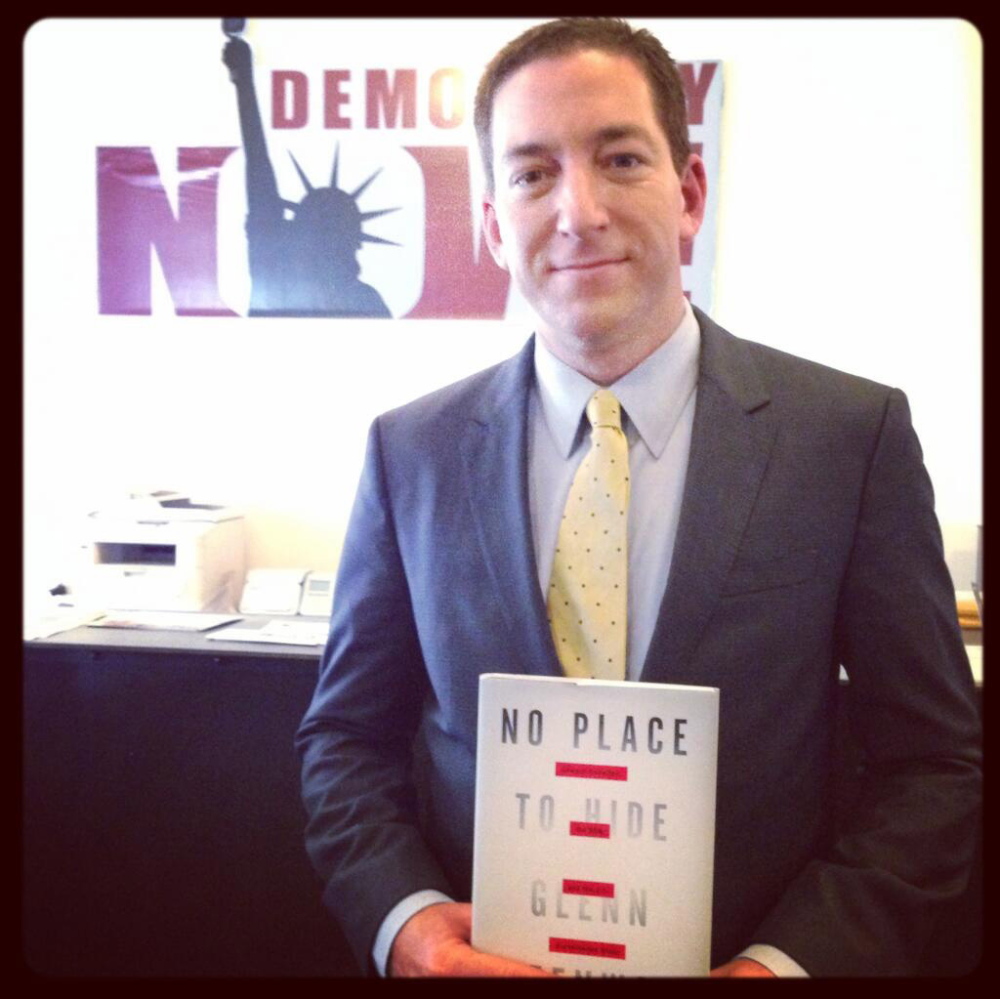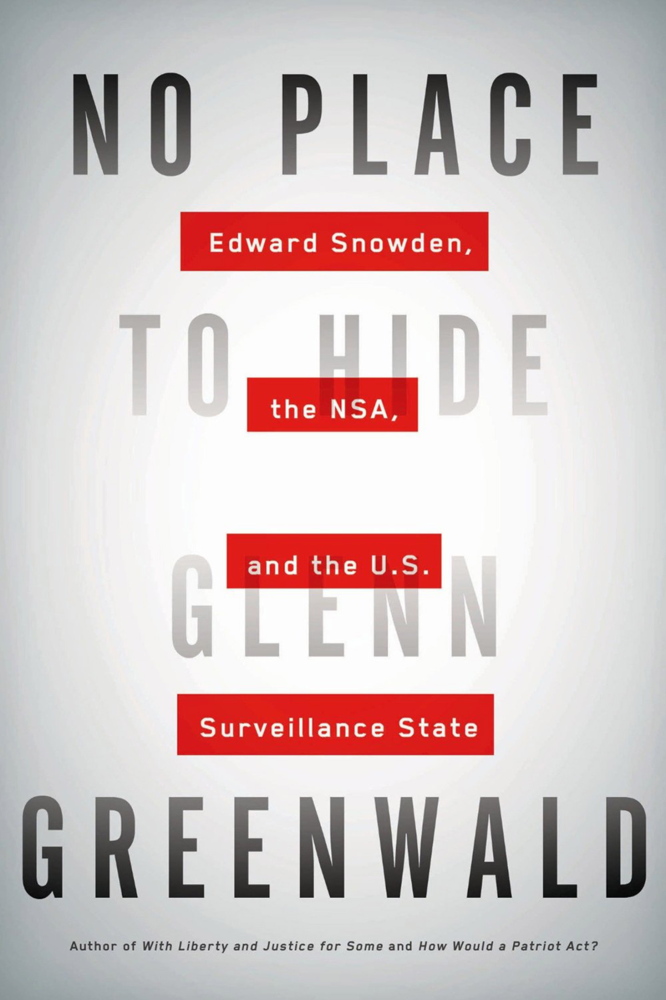In the journalist Glenn Greenwald, Edward Snowden found a perfect match. I don’t mean to slight the contributions of Laura Poitras and Barton Gellman, the other two journalists who first dug into Snowden’s amazing and unprecedented trove of National Security Agency (NSA) documents. Poitras was the one who realized Snowden was for real, and Gellman brought experience to the party. But Greenwald is the fighter – the one you want in your corner when the world comes after you. Snowden knew what he was in for, and he chose his cornerman well.
Greenwald’s pugilistic skills are on full display in his new book, “No Place to Hide: Edward Snowden, the NSA and the U.S. Surveillance State” (Metropolitan Books). My copy came with CONFIDENTIAL stamped on every page and a nondisclosure agreement. In the end, it wasn’t newsy revelations that kept me reading.
Greenwald provides great new details on his most dramatic recent story, including the growth in collection of all kinds of Internet data from major tech companies (up “32 percent in FY12”). But the Snowden leak has, of course, already produced blockbusters, from PRISM (for vacuuming up everything from search history to email content to live chats) to Boundless Informant (for cataloging and mapping metadata from phone calls and emails) to whatever the acronym is for tapping Angela Merkel’s phone. Greenwald’s job in this book is to put the pieces together and tell the story of how it all came to light. And, most of all, to convince us to care.
A million jokesters have invited the NSA to listen in on their calls about feeding the cat or picking up the kids, noting that most Americans aren’t doing anything exciting enough to interest the government.
You are missing the point if you’re in this camp, Greenwald urges: “The true measure of a society’s freedom is how it treats its dissidents and other marginalized groups, not how it treats good loyalists.… We shouldn’t have to be faithful loyalists of the powerful to feel safe from state surveillance. Nor should the price of immunity be refraining from controversial or provocative dissent. We shouldn’t want a society where the message is conveyed that you will be left alone only if you mimic the accommodating behavior and conventional wisdom of a Washington establishment columnist.”
Many writers would stop there. But Greenwald skewers the media outlets and individual journalists he believes proved his point about how “subservient to the government’s interests” the press can be.
He thinks The New York Times has become a “mouthpiece for those in power.” And he singles out Bob Schieffer of “Face the Nation,” Walter Pincus of The Washington Post, Andrew Ross Sorkin of The New York Times and Jeffrey Toobin of the New Yorker for wrong-footedly denouncing Snowden, Greenwald or both as narcissists, plotters or traitors.
Beginning with the Times, in a profile that appeared soon after the first Snowden-driven stories, reporters and columnists labeled Greenwald a “blogger,” a “polemicist” or an “activist” to more easily dismiss him.
Never mind that Greenwald was publishing article after investigative article in the Guardian based on the biggest scoop in half a century. (He’s now working on a Pierre Omidyar-funded investigative journalism startup, and he promises that the biggest Snowden shoe is yet to drop.)
At least the profession woke up in time to award the Guardian and the Washington Post this year’s Pulitzer for public service for breaking the NSA stories.
Reading about all the disclosures again, woven together and in context, I couldn’t decide which was worse: the NSA’s massive, grim overreach, in the hands of Director Michael Hayden, or the complicity of almost every other entity involved, private as well as public. “PRISM is a team sport!” trumpeted one NSA memo. Too true: Other memos and slides show Google, Yahoo, Facebook and Microsoft easing the way toward surveillance of their users. (Twitter was the exception.)
When the Guardian and The Washington Post broke that news, the tech companies tried to argue otherwise based on a technicality. But looking back, the documents “give the lie to Silicon Valley’s denials of cooperation,” as Greenwald writes.
Perhaps worst of all are the Senate and House Intelligence committees, led by NSA boosters like Rep. Mike Rogers, R-Mich., and Sen. Dianne Feinstein, D-Calif., who until a recent spat with the CIA had never met a spying program she didn’t like. These committees are supposed to be our watchdogs. They exist to look out for our privacy.
After the Snowden revelations, tech CEOs took to warning the government that the NSA had to back off lest they lose their international customer base. Congress is still debating a bill that would directly limit NSA surveillance. And President Obama called for cutting back on bulk phone data collection.
All of these shifts came thanks to transparency, which means thanks to Snowden. Because the Bush and Obama administrations went after any government official who disclosed classified information, only a no-holds-barred whistleblower could have blown the NSA’s cover. The internal pressure built, and when the leak finally sprung, it let loose a torrent.
“No Place to Hide” doesn’t offer an in-depth portrait of the leaker. In Greenwald’s protective hands, Snowden is a two-dimensional hero, ever brave and calm, sleeping soundly every night even during the tense initial phase of collaboration a year ago, when Greenwald and Poitras flew to meet him in Hong Kong.
But if you want to get a handle on what was at stake when he downloaded the government’s precious secrets onto a thumb drive, this book is your primer.
Last summer the journalist and the whistleblower took a huge and risky plunge together, along with Poitras and Gellman. Now Greenwald is coming up for air and, with this incisive, slashing book, reaping the benefits of being adventuresome, dogged – and, as far as the evidence shows, right. And yes, the movie deal, Greenwald says, is on the way.
Copy the Story LinkSend questions/comments to the editors.




Success. Please wait for the page to reload. If the page does not reload within 5 seconds, please refresh the page.
Enter your email and password to access comments.
Hi, to comment on stories you must . This profile is in addition to your subscription and website login.
Already have a commenting profile? .
Invalid username/password.
Please check your email to confirm and complete your registration.
Only subscribers are eligible to post comments. Please subscribe or login first for digital access. Here’s why.
Use the form below to reset your password. When you've submitted your account email, we will send an email with a reset code.